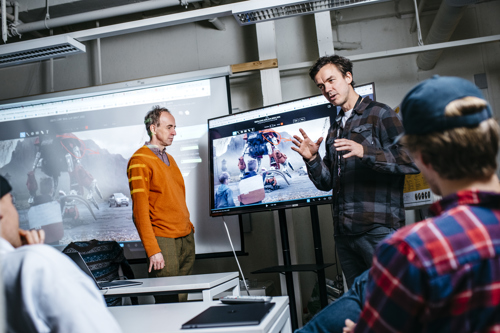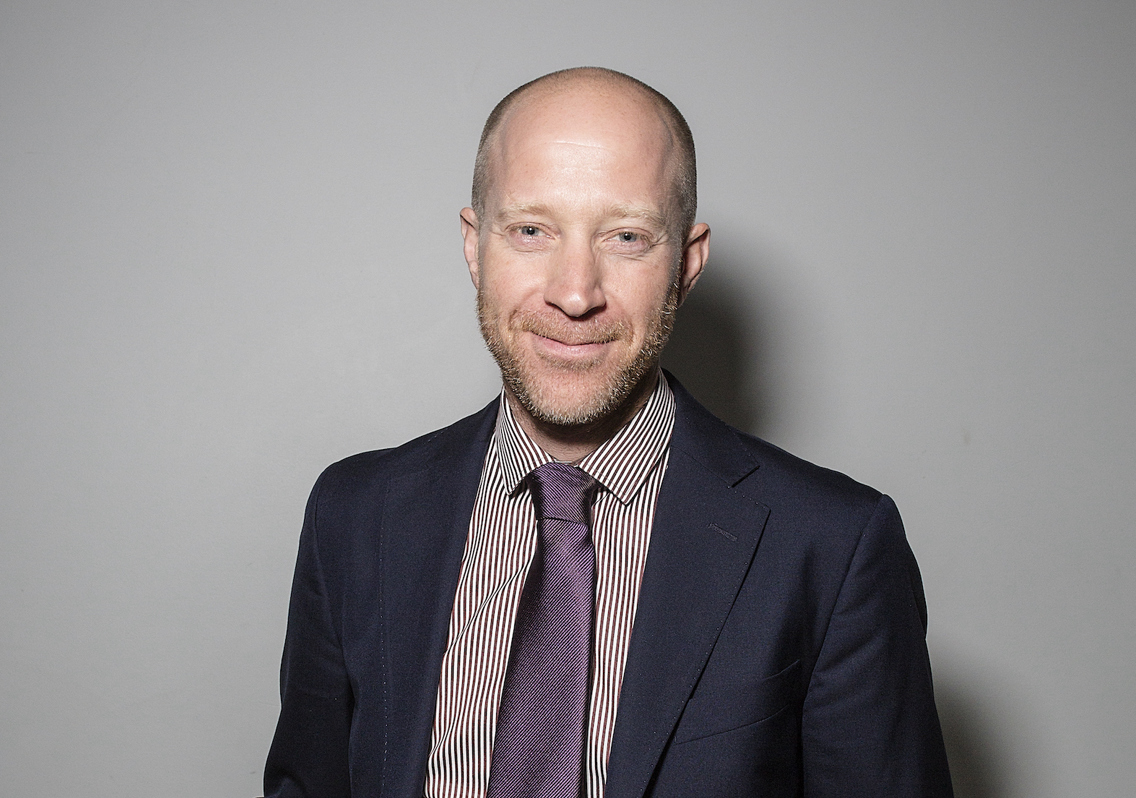Digitalisation and the future of airports
Professor Nigel Halpern conducts research on air transport and tourism management. That is not what he had planned to do. His aim was to go skiing in the Alps. His journey into academia was purely accidental.
When Nigel Halpern was employed by the Department of Marketing at the School of Communication, Leadership and Marketing, few people realised that Kristiania University College had pulled off a coup.
It turned out that Professor Halpern was an international expert with major research projects and a high turnover of research. But it all started with sport.
Skiing in the Alps
– A friend and I were trying to buy a bar in Morzine, a ski resort in France, and we had a meeting with the bank. But things didn't work out because we didn't get a loan, says Halpern.
It was not the bar itself that was important, but the landscape in which was located.
– I have always been passionate about different sports. I used to go skiing in the Alps and I wanted to work near the best places for skiing, Halpern explains.
Sport, outdoor activities and tourism have long been burgeoning industries that are taught at several universities and Halpern took a Bachelor’s degree in sport and leisure management and a Master’s degree in tourism management.
– I was working with sport, outdoor activities and tourism all the time, both before and during my studies. During the winter I was a "ski bum" that worked as a bar manager at night, so that I could ski during the day. In the summer I taught different types of water sports in Spain and France, says Halpern. I have worked as a training instructor and trained others. My journey into academia was purely accidental.
Interrupted by terrorist attacks
He found his way to academia courtesy of British Airways. Halpern was hired by them, but he never started working for them during that autumn in 2001. Just before he was due to start his job, two planes crashed into the twin towers in New York. That terrorist attack changed aviation, developments were halted and his job was cancelled.
– By then I had organised moving to London to start with British Airways and suddenly there I was, with a flat and financial obligations, but no job, says Halpern.
One of our reasons for moving to Norway was to improve our quality of life.
But his appointment with British Airways helped to open doors for him. In London, he obtained new aviation work with the Department for Transport, Local Government and the Regions and the Civil Aviation Authority, which led to a position in academia at London Metropolitan University.
– The people who employed me at London Metropolitan University took quite a chance, Halpern smiles. I had only worked briefly in the aviation industry and I had attended a course on aviation when I did my Master's degree. But perhaps they saw something that I didn't see myself?
During his years at London Metropolitan University, his academic career took off. The university established a new course on aviation management for pilots who subsequently obtained an academic degree as part of their pilot training, and the course became very popular. Halpern taught, undertook a PhD and a teaching degree, and ended up running the field of aviation studies at the university.
– It was an incredibly exciting period, but it was also quite tough, Halpern admits. I was almost burnt out by the end of it. I put in many long hours at work, but I was also enjoying the nightlife in London, smiles Halpern.
Many Norwegian airports were initially developed by the military or municipalities.
Flew to Molde
When he received an offer from Molde University College, he moved there with his Norwegian wife.
– One of our reasons for moving was to improve our quality of life. London is a great place to start your career. But if you want children and a more balanced life, it's not that easy, Halpern explains.
Much of his research at that time was on air services in remoter areas, where aviation is closely linked to regional development.
– Good air service connections can be important for business development, and can bring more tourists to an area. And when more central or overseas destinations are just a quick flight away, people can be attracted to, and encouraged to remain in remoter areas, says the professor.
Tax-free as a source of income
Aviation is complex and airports are acquiring an ever-increasing role in air service and regional development. Many Norwegian airports were initially developed by the military or municipalities. Most airports are now operated by Avinor, a state-owned company.
Smaller airports are often vital infrastructure for their regions, and we would like to keep them, even if they are not profitable.
– In Norway, there are many small airports and most of these run at a loss. The smaller ones are subsidised by the profits of the largest ones, says Halpern, who adds that Oslo Gardermoen is one of his favourite airports.
To some extent, the discussion about whether or not Norway’s larger airports should offer tax-free shopping relates to how small, unprofitable airports should be funded.
– I don't want to give a specific opinion about the ethics of this, but almost half of Avinor's revenue comes from commercial services, such as tax-free shopping, parking and other commercial activities. These are a major source of income for Avinor. In addition, smaller airports are often vital infrastructure for their regions, and we would like to keep them, even if they are not profitable, says Halpern as he expands on this subject.
Air transport markets are increasingly more deregulated. In such markets, air services are no longer governed by the authorities, but by profitability. But even before the Coronavirus pandemic, most airlines had very tight margins.
Airports are at the forefront of digitalisation.
– More passengers provide airports with increased revenue from commercial services, which is why airports often support airlines seeking to establish new routes or to grow demand for existing routes, explains Halpern. Destinations and industry are usually keen to have new or expanded services, so they might also provide airlines with support in order to grow traffic.
The research conducted by Professor Halpern is directly useful to the industry. He has looked at how airports should approach route development from a marketing perspective, including ways in which airports, airlines and other stakeholders such as the tourism industry should cooperate. Increasingly, he is looking at how airports can become more sustainable, especially in relation to their impact on the climate. He is also looking at how to improve the passenger experience at airports.
Digitalisation
– Airports are at the forefront of digitalisation. They are constantly working on finding more efficient ways of moving large numbers of passengers through airports. In just a few years, we have progressed from manual services to doing a lot more online or with the assistance of self-service technologies, says the professor.
Halpern has just finished leading a major research project funded by the Research Council of Norway on the digitalisation of airports in Norway. This project was a collaboration between Kristiania University College, Molde University College, Cranfield University in England and the Norwegian airport operator Avinor.
The project investigated the impact that digitalisation can have on passengers and how it can improve passenger experiences and airport efficiency. The rapid development of digital technologies also raises several new questions about how the technologies best can be integrated with existing airport infrastructure.
– In principle we can complete several key processes at home today and simply walk straight through the airport and onto the plane. Biometrics, such as facial recognition, offer one of several solutions for this, but issues such as privacy need to be addressed before it can be fully used, says Halpern.
Our research suggests that leisure travel will pick up quickly after restrictions relating to the pandemic are removed.
In addition, not everyone welcomes the use of digital technologies at airports.
– According to our research, about a quarter of all passengers with luggage would rather meet an employee when they check in. The problem with this is that it often causes queues and not many people like that," smiles Halpern.
Aviation during the pandemic
The Coronavirus pandemic has presented new challenges for aviation.
– Queuing and close contact with surfaces and other people make us vulnerable to contracting the virus, so there is a growing need for contactless and touchless services at airports.
According to Halpern this could prompt more digitalisation.
The professor believes that we will continue to fly because many people find travelling to be a fundamental need.
– Our research suggests that leisure travel will pick up quickly after restrictions relating to the pandemic are removed. Many people are waiting for the opportunity to travel again, but want more confidence about the situation regarding restrictions before booking. For business trips, it may take longer before we return to the level we had previously. After all, many meetings that were previously done in person can be conducted online," says Halpern.
– But even before the Coronavirus pandemic, concerns about the climate were starting to affect demand for air travel, and are also expected to affect demand as we recover from the pandemic, he emphasises.
A great choice
Halpern has been with Kristiania University College since 2015.
– We were supposed to hire someone qualified in hotel management, says Dean Helene Ingeborg Sætersdal. But fortunately we realised that this researcher was someone who we needed to take a closer look at.
And this has turned out to be a great choice.
We live in an increasingly global and digital society and we need to be able to fly, but at the same time we need to become more sustainable.
– Nigel Halpern is a brilliant employee who is hardworking and produces results in all areas; in his teaching, in his research and as a colleague and employee, Sætersdal continues enthusiastically.
She emphasises that Halpern is an international researcher. He has taught and presented at conferences in more than 30 countries and is affiliated with several universities around the world. In addition to having an extensive output of scientific articles, he has been on the editorial board of several international journals and has published a number of books.
Digital sustainability and the future of aviation
Aviation needs to be more sustainable and digitalisation is going to increase.
– We live in an increasingly global and digital society and we need to be able to fly, but at the same time we need to become more sustainable, says Halpern. I believe that two trends - sustainability and digitalisation - can be united so that we can develop an industry that better balances economic growth with social equity and environmental protection.
– A key aim is to be able to fly, but with a reduced impact on the environment.
– I have family in England, and I haven't seen them much because of the Coronavirus pandemic. I hope we can avoid that in the future, says Halpern, who would like to fly and visit his family, but in a way that avoids health risks associated with the pandemic, and is less harmful to the environment.
Bikes are a winner
Halpern has been an active sportsman for many years.
– In the winter I do a lot of skiing. But at other times of the year I do a lot of cycling, he says.
And apparently he does not just attend small local events. He has participated in both the Birkebeiner Race and other major competitions such as the Norwegian Cup and the Norwegian Masters Championships.
Being a modest Brit, Halpern would rather not emphasise the fact that he is a good at cycling. The description he prefers is "an enthusiastic hobby cyclist", and he has plenty of enthusiasm!




